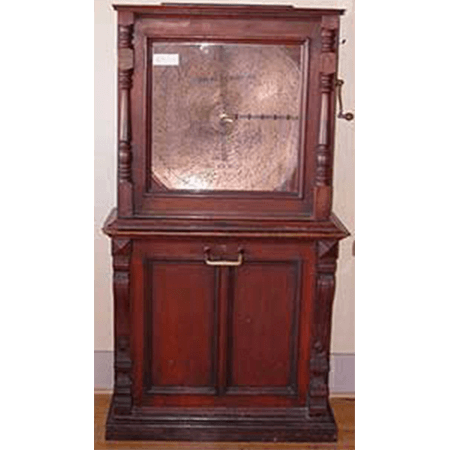
Regina 27″ Upright Music Box
Manufacture date: 1919
Song Title: Silver Bells
[audio mp3="https://www.virginiacitymusic.com/wp-content/uploads/2021/05/silver_bells.mp3"][/audio]
Purchased in 1941 in Great Falls, this non-changer music box is typical of Regina instruments. While cylinder music boxes had been made for hundreds of years in Germany and Switzerland, they were expensive and their musical selections limited by the very tedious pinning of the cylinders. Even the expensive models played only a few - six to ten - songs, and only the wealthiest could afford additional cylinders.
In 1889, a disk-style music box was invented. The disks, made of flat steel, could be pressed, in one quick operation, to form pins, which played the musical comb as in the cylinder music boxes. The interchangeable disks gave huge musical selection; one could easily have any number of pieces of music and change them in a few seconds. Unlike the fragile cylinders, the disks were easy to reproduce, quite durable, and unbreakable.
Despite a huge potential market, the American-made disk music boxes did not appear on the scene until the early 1890s. The tonal quality was outstanding, and the musical selections, despite having to fit a perfectly timed single revolution, were even better. By 1900 many middle-class homes were enjoying the beautiful and calming music of a Regina. The complaint in public places that the same disk was played over and over led to the development of a commercial model that one could select the piece he wanted to hear, or that would play the selections in sequence. The machinery - gears, cams, spring motors -worked silently "like clockwork". The cases were works of art. This was all yet in a time when player pianos and other pneumatic instruments had not yet been well perfected.
For about ten years the Regina music box reigned supreme in automatic home entertainment, but then an unlikely challenge came to that market from a place barely five miles from the Rahway, New Jersey Regina factory -the Edison laboratories of Menlo Park, and later of East Orange, New Jersey. Edison had envisioned the main use of his invention of the Phonograph as the office machine, but when he was finally convinced about 1902 to introduce the phonograph and cylinders pre-recorded with music to the general public, it became all the rage. Despite the poor quality of the music on the records compared to the fabulously superior quality of the music boxes, the Edison Phonograph quickly took over.
About this time, Eldridge R. Johnson called on the Regina factory and tried to sell them a patent invented by Emile Berliner, the disk record. He was rejected, of course. He next talked to Edison -he too declined. Mr. Johnson went home to Camden, New Jersey, also not far away, and started the Victor Talking Machine Co.
In 1902 Regina "diversified" by introducing a cumbersome and unlikely device related more to pneumatic pianos than their mechanical music boxes -a hand-operated vacuum cleaner. Though their last music box was made in 1919, Regina continued to make a variety of products. Regina is one of the few former music machine makers that are still in business. Today it is well known as the manufacturer of vacuum cleaners.
